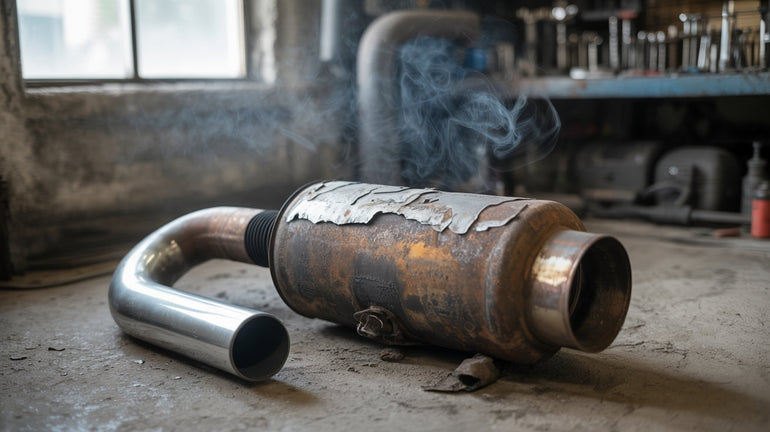TLDR:
Why do some mufflers get louder over time? This happens due to factors like exhaust loudness increasing from rust, holes, or damage, and aftermarket exhaust parts may also change the sound, leading to sudden loud exhaust noises.
---
Understanding Exhaust Loudness
Why Does My Exhaust Get Louder Over Time?
Have you ever noticed your muffler getting louder the longer you drive? Well, there’s a few reasons why that happens.
- Muffler Degradation: Over time, mufflers wear down. Heat and nasty stuff like rust can mess up the materials inside.
- Muffler Packing Deterioration: Inside some mufflers, there’s packing material that soaks up sound. When this packing breaks down or blows out, your exhaust gets way louder.
- Sudden Increase: Sometimes noise jumps up fast. That usually means something’s wrong—like blown out packing or damage somewhere in the exhaust system.
- Exhaust Sound Change: If you tweak your engine or it acts different, the way gas flows changes too. That can make your exhaust sound not quite like before.
If you spot a loud muffler or a sudden change, it means your muffler packing might be blown out or starting to fail. This makes a big, noticeable difference in sound. Keep an eye (or ear) on these signs so you don’t miss anything important.
The Science of Sound: How Exhaust Systems Work
To get why mufflers get louder over time, let’s look at how exhaust systems do their job:
- Muffler Function: Mufflers cut down noise from the engine’s exhaust gases but still let those gases flow through easy.
- Exhaust Gas Flow: When gas flows right, it keeps backpressure low. That helps your engine run better and stay quieter.
- Sound Attenuation: Mufflers have parts like chambers and baffles that lower certain sound frequencies made by burning fuel.
- Exhaust Backpressure: Some backpressure is needed for the engine to work well. But too much pressure makes more noise and hurts performance.
- Sound Frequency & Vibration: Parts inside the exhaust shake at certain frequencies when gas passes through them. Those vibrations add to how loud things sound.
So when your mufflers get louder over time, it usually means parts inside are wearing out or packing is gone blown out. Knowing how exhaust systems work helps you figure out what’s going on and when to fix stuff before noise gets bad or performance drops.
Rust, Holes, and Cracks: The Silent Destroyers
Rust and corrosion sneak up on your muffler and exhaust system over time. Moisture, road salt, and debris wear down metal parts bit by bit. This causes holes in the exhaust pipe or a rusty muffler that can't keep engine noise in check. When rust forms cracks or holes, exhaust leaks pop up. These leaks make your muffler sound loud and show signs of muffler damage.
Road debris impact can dent or crack pipes too. Even tiny holes let dangerous gases out before they reach the catalytic converter. Exhaust system leaks lower your car’s performance and fuel economy while raising emissions.
Here’s what rust damage can do:
- Create holes in exhaust pipes
- Cause loud muffler sounds
- Let harmful gases escape early
- Reduce fuel efficiency
- Increase emissions
Check your exhaust regularly to spot rust early. Fixing or swapping corroded parts helps your car run smooth and quiet.
Muffler Malfunctions: When Your Muffler Fails You
You might hear a sudden increase in muffler noise when problems start. Over time, mufflers suffer packing material wear inside. This changes the sound resonance—your once quiet muffler grows louder with a deeper tone.
Common causes are cracked mufflers from bumps or muffler deterioration from heat and rust. Mufflers get louder over time because worn packing can’t soak up engine noise well anymore.
Look out for:
- Muffler noise increase
- Startling vibrations
- Sound becoming deeper or louder
- Muffled tone change to harsh rattling
If you ignore these signs, things can get worse. Exhaust manifold problems or more emissions might follow because your exhaust system isn't working right.
Fixing these issues soon keeps your car quieter and healthier.
For good replacement parts made to fit right and perform well, check mufflers for different cars.
Catalytic Converter Complications: More Than Just Emissions
Your catalytic converter does more than just cut emissions—it also helps keep your car healthy. When it fails, strange noises like rattling can happen due to broken bits inside (catalytic converter noise).
Ignoring these sounds is risky. It may cause less engine power and push out more harmful emissions that break rules.
If you face catalytic converter failure, replace it fast with parts made to fit exactly (direct-fit catalytic converters).
Keeping it in good shape protects your emission controls and keeps driving safe.
Exhaust Manifold Mishaps: Leaks and More
Leaky exhaust manifolds often start with gasket problems. Heat can make seals crack or warp (exhaust manifold gasket failure). Then hot gas escapes causing vibration or rattle sounds near the engine (jammed exhaust).
These leaks hurt engine power by messing with gas flow through the system. That means worse fuel use and maybe long-term damage if you wait too long to fix it.
Signs include rattles under acceleration or slower engine response. Getting a tech to check it fast helps avoid noisy rides and bigger trouble.
Want upgrades? See our collections for catback and axle-back systems. They offer style plus better function for enthusiasts.
Ready to get back quiet rides? Schedule service now with pros who keep your exhaust running smooth!
Diagnosing the Problem
Simple DIY Checks for a Louder Exhaust
If your car exhaust sounds louder suddenly, don’t panic. You can do some simple DIY checks first. A sudden increase in muffler noise might mean something’s wrong, but you may fix it yourself or catch it early.
Start by looking at the muffler and exhaust system. Check for holes, rust spots, or parts that seem loose. These can cause muffler sound changes. Try tapping the muffler gently with something soft like a rubber mallet. If you hear rattling, there might be damage inside.
Also, look under your car for hanging parts or pipes that are disconnected. Sometimes clamps get loose over time and cause loud noises. Next, listen while you rev the engine. If muffler noise increases loudly when you press the gas, it could mean cracks or leaks.
Keep an eye on these changes as part of your vehicle maintenance schedule. Write down when you notice a noticeable difference in exhaust noise. This helps if you later need to talk to a mechanic.
Here’s a quick checklist:
- Inspect muffler and exhaust for holes or rust
- Tap muffler and listen for rattles
- Check for loose or hanging pipes
- Listen to muffler noise during engine revving
- Record any sudden increase in sound
Following these steps gives you basic info before calling someone else.
When to Call a Professional: Knowing Your Limits
Sometimes problems go beyond what you can check yourself. It’s smart to know when to get professional help.
If you see muffler damage like cracks or big holes, or if you think there’s an exhaust leak, don’t wait. These issues raise muffler noise and can let harmful fumes inside your car. Plus, they hurt engine performance.
Certified technicians use advanced diagnostic tools for a thorough diagnosis. They figure out if your muffler needs repair or replacement based on what they find.
Good pros offer reliable and quiet fixes after repair. They also use quality parts that last longer.
If you want trusted help with warranty-backed service and installation, check out Gexhaust’s Axle-Back Mufflers.
Knowing when to call experts protects your vehicle and keeps it running smooth—and sounding just right—every mile.
Finding the Perfect Replacement Parts at Gexhaust
A loud muffler usually means it’s time for repair or replacement. Your car might need a muffler repair, exhaust pipe replacement, or professional exhaust repair. Picking the right parts matters a lot. Gexhaust offers many aftermarket muffler installation choices to bring back quiet rides and better sound.
People who want more power often look for performance exhaust upgrades. These parts boost both power and tone. Every piece fits well and lasts long. If you wonder whether to repair or replace your muffler, the pros at Gexhaust can help you decide. They know what works best for your budget and needs.
Premium Quality Exhaust Components: Built to Last
Quality is key when choosing exhaust parts. At Gexhaust, each product passes tough tests for longevity and efficiency. Our certified technicians bring top-notch service that makes sure your system runs quietly and reliably.
Many components use stainless steel packing to fight rust. This also keeps sound under control as time goes on. That means you get better performance without losing comfort on your daily drive.
Good quality parts mean fewer repairs later on. They also help fuel flow better, which can save gas. You can trust these materials and skilled work to last way beyond regular replacements.
Here are some things we offer:
- Durable catback systems
- Great sound tuning
- Long-lasting materials
Easy Online Ordering and Expert Support from Gexhaust
Shopping online should be easy and clear. Gexhaust makes it simple with product info backed by expert insights. Our knowledgeable team covers many vehicle models so you pick the right parts with confidence.
If you have questions during ordering or install, our friendly support staff helps out with honest advice. They have years of experience working on exhaust upgrades.
From browsing detailed listings to setting up pro installs, we keep it simple and clear every step of the way.
Ready to upgrade your ride? Check out premium exhaust parts today at Gexhaust — where good quality meets real know-how!
Regular Inspections: Keeping Your Exhaust System Healthy
A loud muffler or more muffler noise means the muffler might be wearing out. You need regular checks to catch these problems early. Doing exhaust system maintenance stops vehicle exhaust problems like muffler corrosion, rust damage, and exhaust pipe holes.
Rust forms when moisture mixes with road salt and debris. This makes your exhaust parts wear faster. Road debris impact can cause dents or cracks that get worse over time if you don’t fix them. Following a vehicle maintenance schedule helps you find these issues sooner.
When you inspect, listen for strange noises. Look for rust spots or holes in pipes. Fixing small leaks keeps sound dampening working well. It also stops louder sounds caused by gases escaping damaged parts.
Do regular checks yourself or get a pro to do it. This helps your exhaust last longer and keeps your ride quiet and working right.
Protecting Your Exhaust from the Elements
Exposure to water, salt, and dirt causes muffler corrosion and rust damage. These things hurt exhaust system durability over time. Taking steps to protect your exhaust slows this down.
One way is to wrap your exhaust with an exhaust wrap. This wrap shields metal from moisture that causes rust. It also helps control heat changes that wear out parts.
Parking under cover keeps rain or snow off your muffler and pipes. This reduces rust formation on exposed spots.
Taking care like this keeps your exhaust working well longer without breaking from weather damage.
Good maintenance and protection keep your car running smooth—and quiet—for a long time.
The Gexhaust Difference
Experience the Gexhaust Advantage: Quality, Performance, and Peace of Mind
A loud muffler usually means something's wrong. At Gexhaust, we fix mufflers and take care of your exhaust system so your car runs smooth and quiet. Our techs have lots of experience. They know how fixing problems fast helps your parts last longer and work better.
Rust, cracks, or loose parts cause noise. We catch these early with regular check-ups. Our team handles everything—from finding the noisy muffler to fitting top-quality replacement parts made for great performance. You can count on us to guide you through every step.
Picking good parts from trusted brands boosts engine power and lowers pollution. Need an axle-back upgrade or a new catalytic converter? We offer solutions that mix strong power with quiet rides. This saves you from expensive repairs and gives you a better drive.
Join the Gexhaust Community: Connect with Fellow Car Enthusiasts
Customer satisfaction is what we aim for at Gexhaust. We earn trust by being honest and sharing what we know. Our community gathers around “Straight Piped by Gexhaust,” where car fans swap tips on upgrades and fixes.
You’re welcome to join this upbeat group. Here, pros give clear advice to help you feel sure about your ride. We break down tricky ideas into simple steps anyone can follow—whether you want to do it yourself or get expert help.
We don’t just sell parts; we build relationships based on trust and helpfulness. Every driver should feel supported when working on their car.
Look at our selection of catback exhaust systems. They improve power without making too much noise.
Thousands trust us for good parts paired with smart advice. Get ready to hear your engine roar just right!
FAQs about Why Do Some Mufflers Get Louder Over Time?
What causes muffler packing material to wear out?
Heat, vibration, and exposure to exhaust gases break down muffler packing over time. This loss reduces sound absorption.
How does carbon buildup affect muffler sound?
Carbon deposits inside mufflers block airflow. This causes exhaust noise to grow louder and change tone.
When should I consider muffler repacking or replacement?
If your muffler sounds deeper or louder suddenly, check for blown-out packing or damage. Timely repairs prevent further issues.
Can aftermarket exhaust parts change my vehicle’s sound?
Yes. Aftermarket mufflers often alter exhaust tone and volume. They may cause louder or raspier sounds than stock parts.
How does exhaust backpressure impact muffler noise?
Proper backpressure controls engine noise. Too little or too much backpressure causes muffler sound variations and performance drops.
What risks come from ignoring a louder muffler?
Ignoring it may lead to exhaust leaks, reduced fuel efficiency, increased emissions, and potential health hazards from escaping gases.
How do professional technicians diagnose exhaust problems?
They use advanced diagnostic tools to detect leaks, blockages, or worn parts. This thorough diagnosis ensures reliable repairs.
What are signs that indicate a need for muffler replacement?
Look for deepened tone, rattling sounds, visible holes, rust corrosion, or sudden loud exhaust noises.
Essential Points on Muffler Lifespan and Exhaust System Care
- Muffler lifespan shortens due to heat, rust, and vibration effects.
- Regular inspections catch early wear and prevent nuisance noises.
- Exhaust system leaks lower engine performance and raise emissions.
- Carbon buildup causes mufflers to get louder with a rougher tone.
- Professional exhaust repair uses certified technicians for reliable service.
- Advanced diagnostic tools aid in accurate detection of exhaust issues.
- Timely repairs improve longevity and maintain efficient emission control.
- Sound reduction techniques depend on intact muffler packing materials.
- Exhaust gasket repair prevents dangerous leaks near the manifold area.
- Performance exhaust upgrades offer controlled sound tuning without excess noise.
- Aftermarket mufflers may be easy to install but can change stock exhaust sound evolution.
- Vehicle noise regulations require keeping muffler noise within legal limits.
- Muffler vibration or rattling often signals internal packing deterioration or damage.
- Exhaust system cleaning removes carbon deposits that affect sound levels and flow.
- Expert insights help choose between repair or replacement for worn components.
Enhance your car’s quiet ride by addressing issues early with trusted professionals at Gexhaust.





